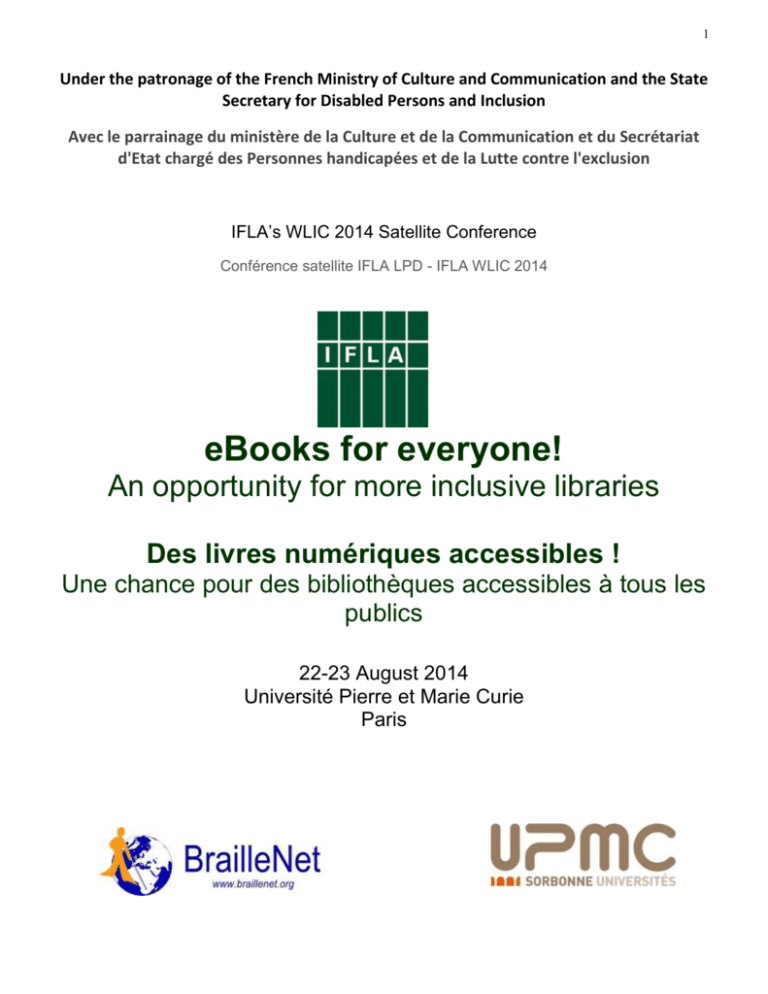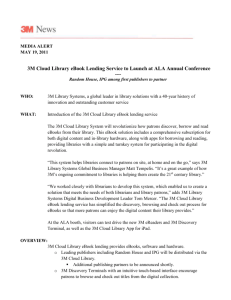Daisy Online Delivery Protocol Makes eBooks Accessible in Flemish
advertisement

1 Under the patronage of the French Ministry of Culture and Communication and the State Secretary for Disabled Persons and Inclusion Avec le parrainage du ministère de la Culture et de la Communication et du Secrétariat d'Etat chargé des Personnes handicapées et de la Lutte contre l'exclusion IFLA’s WLIC 2014 Satellite Conference Conférence satellite IFLA LPD - IFLA WLIC 2014 eBooks for everyone! An opportunity for more inclusive libraries Des livres numériques accessibles ! Une chance pour des bibliothèques accessibles à tous les publics 22-23 August 2014 Université Pierre et Marie Curie Paris 2 Daisy Online Delivery Protocol Makes eBooks Accessible in Flemish Public Libraries B. Paepen, Co-founder, Pyxima and J. Delaure, Program Manager, Bibnet Short abstract— In May 2014, Flanders launched an eBook lending service for 215 public libraries. The service has made an initial collection of 400 eBooks available for viewing on tablets and smartphones by up to one million library members. By using the Daisy Online Delivery Protocol, the eBook collection can also be made accessible to print-impaired people in a design for all philosophy. INTRODUCTION This paper discusses the challenges and solutions this project has experienced in setting up business models with publishers, in handling Digital Rights Management (DRM) protection and in achieving access for all. During the presentation we will also give a hands-on demonstration of what the reading application looks like and how users perceive it after four months of operational service. I. LIBRARIES IN A DIGITAL ERA Libraries in all countries are struggling with the question of what role existing libraries should play in a digital era. As long as books are physical objects, the library stands tall as a building for preserving and accessing these important cultural artefacts. However, as soon as books became digital objects, readily accessible on computers and handheld devices, the role of the same library is questioned. “When Google already indexes all of the world’s writings, why do you still need a public library?” one might ask. This project started from the proposition that in a digital era libraries have an equally important role in providing access to culture to all citizens. Firstly, access needs to be a low-barrier in economic terms. Secondly, access needs to be provided on devices that many users already have with an intuitive interface. Thirdly, the library has a role in promoting e-reading and helping readers with their first e-reading experiences. Finally, by their very nature, digital books can be rendered in such a way that they become equally available to persons with Bert Paepen is Co-founder at Pyxima, Tessenderlo, Belgium (e-mail: bert.paepen@pyxima.com). Johan Delaure is Program Manager at Bibnet, Brussels, Belgium (e-mail: johan.delaure@bibnet.be). a reading impairment. New published eBooks can become immediately available in large font or with text-to-speech functionality at a marginal cost. Without a publicly funded eBook library service, there is a good chance that these requirements will never be met. As a consequence, many will have no access to eBooks, thus widening the digital divide. II. REQUIREMENTS FOR STAKEHOLDERS When setting up an eBook lending service, many stakeholders are involved, each with potentially conflicting expectations. Readers expect low-barrier access to library eBooks, i.e. for free. Moreover, it should be possible to borrow eBooks anywhere at any time: from home, when on holiday, etc. All books should be immediately available at all times without having to place holds. Books need to be accessible even when the device on which they are read is offline. Where people can dream of unlimited immediate access to eBooks, library institutions consider it their public mission to ensure low-barrier access to information and culture. However, when all eBooks are available for free at all times, the basis for the current remuneration model for rights holders is annihilated. The public library’s mission is not merely to lend books but above all to help people to find their way in the informational and cultural offering of the community. This role has to be reinvented in respect of the digital offering of literature and information. Book publishers, experiencing a decline in paper book sales, can see libraries as an additional distribution channel for eBooks. At the same time they want to avoid libraries becoming competitors to their own commercial eBook services. III. BUSINESS MODEL A key success factor for this project was to find a suitable business model that reconciles these conflicting requirements. In many countries eBook lending models have been set up with rules to make digital access resemble paper book lending. Examples include the one copy one user model and limiting usage per book by ‘aging’ books after a certain number of loans. These models try to reconcile free access with the old remuneration concept of book sales. However, they abnegate the nature of digital access and limit user experience in a way that is unacceptable for an electronic product. In other countries we see models where lending eBooks is free of charge for end users and local governments pay publishers in bulk or per loan. In the known cases these experiments are stopped because it leads to untenable government expenditure and/or market distortion. Also, publishers in Flanders refused free lending as it would raise public expectation that eBooks should be available for free. 3 After months of negotiation, six of the largest publishers in Flanders agreed to set up a one year pilot period with a limited number of their eBooks in a model that combines free access and paid lending. Within the physical library walls, everyone has unlimited free access to all eBooks in the catalogue. Outside, free access is limited to samples. To get full access outside of the library, library members can borrow eBooks in a 3 for 5 (345) model: you can borrow 3 eBooks for 4 weeks each at a cost of 5 euros (so, €1.66 per loan). Lending and actual reading are managed and controlled in an “app” that protects the content against copying and ensures that the eBook becomes unavailable after 4 weeks. For local libraries the service is an opt-in that comes with a subscription fee that is an initial flat startup fee combined with the pricing for a minimal number of loans calculated in relation to the area that the library serves. There is no maximum limit on loans: once the minimal number of loans is ‘consumed’ libraries can continue lending. The incurred costs for these extra loans are at the same rate as the rate that the library has to impose on the end-user. Publishers receive a base fee for each book they make available to the lending catalogue, they receive a nonrefundable fee for a minimal number of loans imposed and they receive a fee for each additional loan. The more loans, the more they earn. IV. ACCESS FOR ALL ARCHITECTURE End users get access to eBooks (ePUB format) via computer, tablet or smartphone. Through the website, users can explore the eBook catalogue from home and consult samples. Within the library walls users have full unlimited access to all eBooks. To get full access outside the library one has to borrow the eBook. Lending is only possible on Android and Apple tablets or smartphones with an app that is developed by Pyxima against their Daisy Online Delivery Server. Through the safe environment of the app it is possible to allow users to read the borrowed eBooks even offline. For Bibnet it was important that the interaction with end user was implemented through the Daisy Online Delivery Protocol (DODP), for a number of reasons: 1. Systematizing the process flow without having to “reinvent the wheel”. 2. Adding future services such as wish lists and multiple bookmarks without redesigning the process flow. 3. The fully documented DODP provides transparency to right holders on the processing between app and server. 4. Inheriting security conditions that are a native part of DODP and reusing know-how on reporting, optimization, etc. 5. Making the service also accessible to DAISY players. 6. Providing a cost effective perspective on migrating to EPUB3 and adding generic text–to-speech support. 7. It allowed us to focus on the visual attractiveness of the app and the e-reading experience. Fig. 1 depicts the system architecture, which is largely based on the Online Daisy audio book distribution system. repository repository distribution server distribution server watermarks watermarks Fig. 1 eBook distribution architecture The system fully supports cross-device reading by storing the last reading position on the server. People could start reading an eBook on a tablet and continue listening via computer voice on their smartphone. Readium is used as the main component for e-reading, both in the apps and on the website. App security, combined with digital watermarking and restricted reading periods, ensure correct DRM protection. Access to the reader’s personal bookshelf is password protected in an OAUTH based identification system. “Intra muros” reading with full access within the library walls is reinforced by using Wi-Fi localization. CONCLUSION “E-boeken in de bib” is the first app in the institutional environment of the Flemish government that provides a core public service. The first success of the project is that it brought all stakeholders, from publishers to librarians, together on agreeing on a single business model. The strength of this model is that it combines free eBooks within the library with low-barrier access outside the library and at the same time financially encourages rights holders with a cost per use. At the time of writing it is too early to fully assess the public adoption of this new eBook lending service in a region where at the beginning of 2014 the eBook occupied nearly 2 % of the entire book reading market. At the end of 2014 we will start evaluating the offering, the usage numbers, the strengths and the weaknesses, in order to decide whether to continue after April 2015. REFERENCES [1] E-book lending service: http://e-boeken.bibliotheek.be [2] Online Daisy: http://www.online-daisy.com [3] Pyxima: http://www.pyxima.com [4] Bibnet: http://www.bibnet.be BIOGRAPHIES B. Paepen obtained masters degree in communications and ICT at Leuven University in 1997 and 1999. He first worked as a software developer at Philips and was a researcher at Leuven University, after which he co-founded the spin-off company Pyxima in 2009. Pyxima is a Belgian software company specialized 4 in making eBooks and audiobooks accessible for reading impaired persons. Pyxima www.pyxima.com developed the Flemish audio newspaper and the Online Daisy platform, www.onlinedaisy.com. J. Delaure is Program Manager at Bibnet (Agency for Digital Library in Flanders) www.bibnet.be. During the first 15 years of his career Johan worked as a Project Manager for the development and implementation of library management systems. He has been working at Bibnet, a Flemish government subsidiary, for 13 years, where he is responsible for optimizing and developing the central IT infrastructure to facilitate public libraries. Le protocole "Daisy Online Delivery Protocol" permet l'accès de tous à des livres des bibliothèques publiques flamandes En mai 2014, la Flandre a lancé un service de prêt de livre électronique pour 215 bibliothèques publiques. Le service a proposé une première collection de 400 livres numériques disponibles à un million de membres de la bibliothèque, pour l'affichage sur tablettes et smartphones. En utilisant le protocole Daisy Online, la collection de livres électroniques peut également être rendue accessible aux personnes empêchées de lire dans une philosophie de conception pour tous. Biographies Bert Paepen est fondateur de Pyxima, une société belge de logiciels, spécialisée dans la fabrication de livres numériques et de livres audio accessibles (www.pyxima.com). Pyxima a développé le journal audio flamand et supporte la plate-forme en ligne Daisy, www.online-daisy.com. Johan Delaure est responsable de programme à Bibnet (Agence pour la bibliothèque numérique de Flandre) www.bibnet.be. Durant les 15 premières années de sa carrière Johan a travaillé comme chef de projet pour le développement et la mise en œuvre de systèmes de gestion de bibliothèque. Depuis maintenant 13 ans, il travaille à Bibnet, une filiale du gouvernement flamand, pour optimiser et développer l'infrastructure centrale informatique facilitant les bibliothèques publiques.


